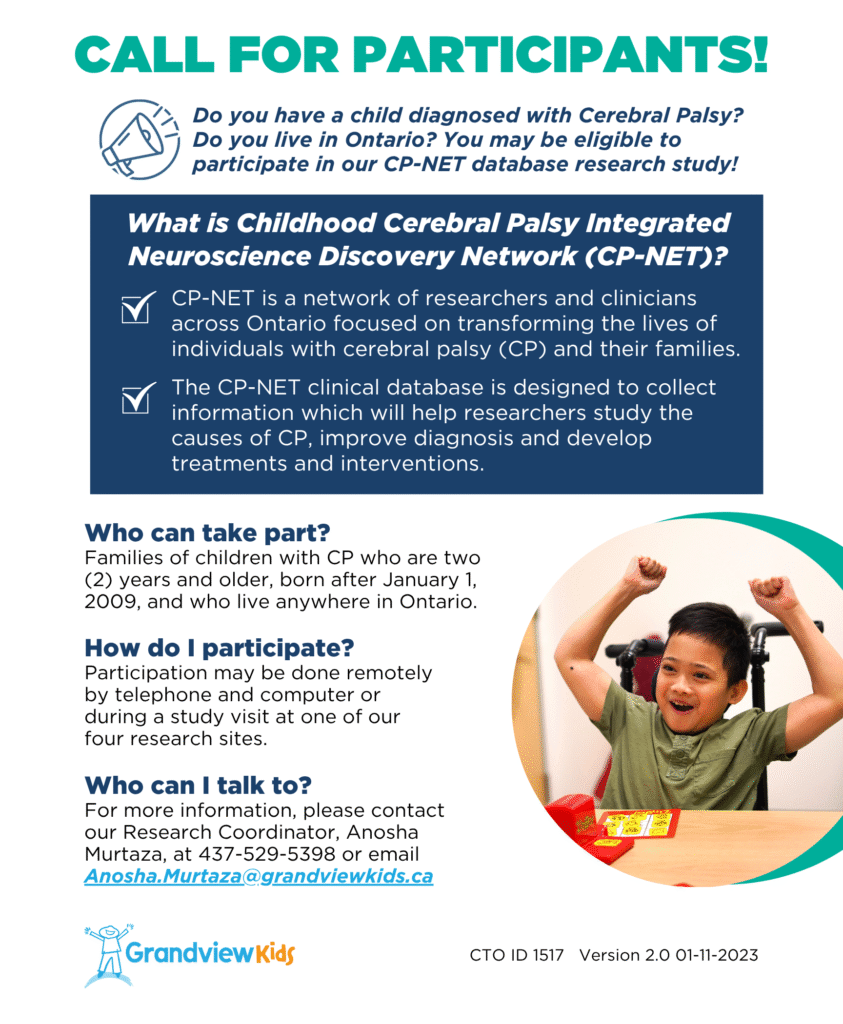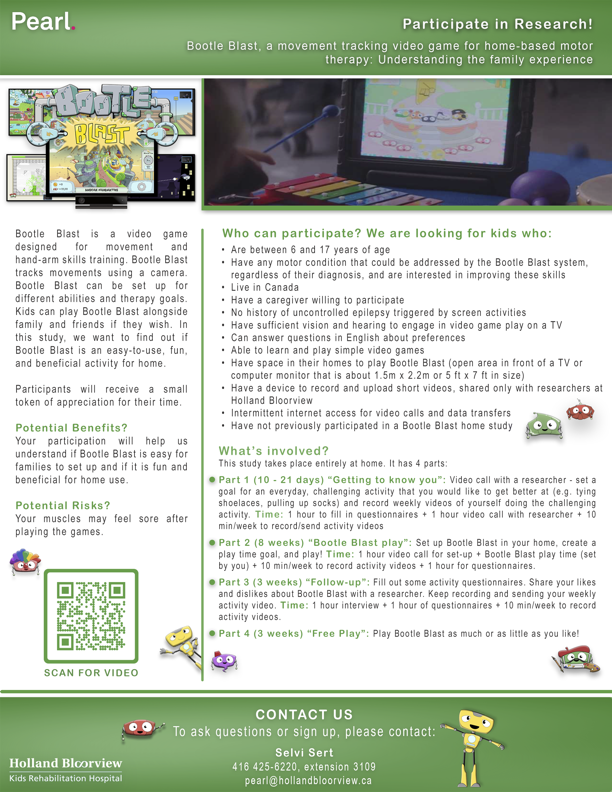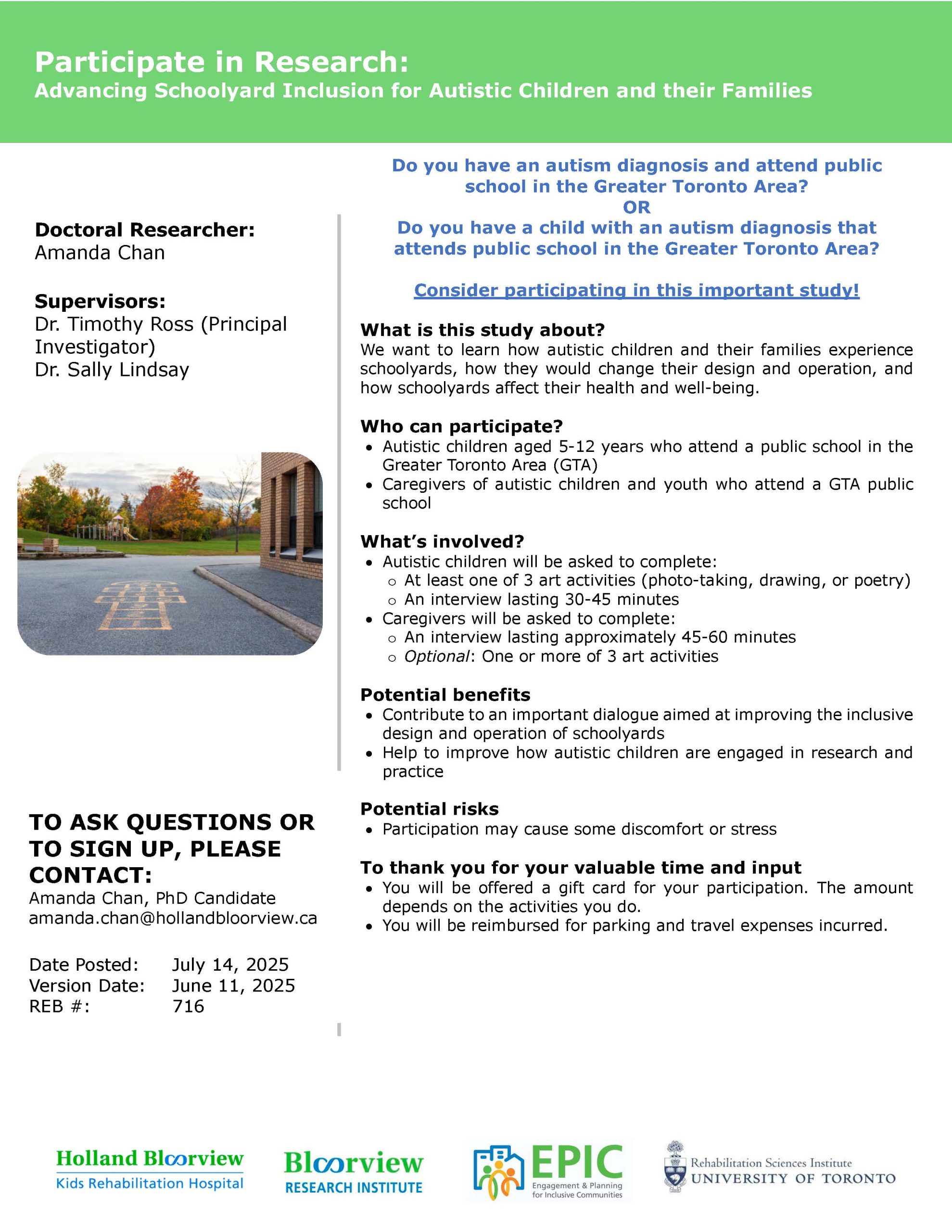New opportunities
The research studies listed below are looking for participants. Each study has received approval from a Research Ethics Board and Grandview Kids. Click on the study title to learn more about who can participate and what you’re asked to do.
Childhood Cerebral Palsy Integrated Neuroscience Discovery Network (CP-NET) – Clinical Database Platforms

Have you or your child been diagnosed with Cerebral Palsy (CP)? If so, consider participating in our research study.
You are being invited to participate in a study that involves building an Ontario Cerebral Palsy (CP) Clinical Database called “CP-NET.” You are invited to participate in this study because you are/have a child who has a diagnosis of CP. The purpose of this project is to store a lot of information about children with all sub-types of CP. This way, researchers and clinicians can try to understand better what causes cerebral palsy and develop treatments and therapies that work in the future.
What’s involved?
Participants will attend three research sessions. The first session occurs shortly after they consent to participate, the second session occurs one year after the first session, and the third session occurs one year after the second session. During these sessions, saliva will be collected from the child and their parents, parents will be asked to complete an interview and some questionnaires and medical records of the child and birth mother (if available) will be requested for review. This will take approximately 1.5-2 hours, and the second and third sessions will take about 30 minutes each. All sessions can be completed on-site or remotely. Forms and other research materials can be mailed to participants’ homes with a return postage stamp to return materials.
Who can participate?
Children aged 2 or more born after Jan 1, 2009, who have CP are invited to participate in CP-NET. Recruitment is ongoing.
Why should you consider participating?
Your participation will enable researchers to study the causes of CP, identify risk factors and develop treatments and interventions to improve outcomes and care for children with CP. Participants will receive a $20 gift card and be reimbursed for parking/public transport at each session if required.
Contact Information
If you are interested in participating in this study or have additional questions, please contact our Research Coordinator, Anosha Murtaza, at 437-529-5398 or email Anosha.Murtaza@grandviewkids.ca with your interest, and she will get back to you. Contacting us does not obligate you or your child to participate in the study.
Study expires: 2028
Bootle Blast, a movement-tracking video game for home-based motor therapy: Understanding the family experience
Bootle Blast is a video game designed for movement and hand-arm skills training. Bootle Blast tracks movements using a camera. Bootle Blast can be set up for different abilities and therapy goals. Kids can play Bootle Blast alongside family and friends if they wish. In this study, we want to find out if Bootle Blast is an easy-to-use, fun, and beneficial activity for home.
Participants will receive a small token of appreciation for their time.
Potential Benefits?
Your participation will help us understand if Bootle Blast is easy for families to set up and if it is fun and beneficial for home use.
Potential Risks?
Your muscles may feel sore after playing the games.
Who can participate? We are looking for kids who:
- Are between 6 and 17 years of age
- Have any motor condition that could be addressed by the Bootle Blast system, regardless of their diagnosis, and are interested in improving these skills
- Live in Canada
- Have a caregiver willing to participate
- No history of uncontrolled epilepsy triggered by screen activities
- Have sufficient vision and hearing to engage in video game play on a TV
- Can answer questions in English about preferences
- Able to learn and play simple video games
- Have space in their homes to play Bootle Blast (open area in front of a TV or computer monitor that is about 1.5m x 2.2m or 5 ft x 7 ft in size)
- Have a device to record and upload short videos, shared only with researchers at Holland Bloorview
- Intermittent internet access for video calls and data transfers
- Have not previously participated in a Bootle Blast home study
What’s involved?
This study takes place entirely at home. It has 4 parts:
- Part 1 (10 – 21 days) “Getting to know you”: Video call with a researcher – set a goal for an everyday, challenging activity that you would like to get better at (e.g., tying shoelaces, pulling up socks) and record weekly videos of yourself doing the challenging activity. Time: 1 hour to fill in questionnaires + 1 hour video call with researcher + 10 min/week to record/send activity videos
- Part 2 (8 weeks) “Bootle Blast play”: Set up Bootle Blast in your home, create a play time goal, and play! Time: 1 hour video call for set-up + Bootle Blast play time (set by you)+ 10 min/week to record activity videos+ 1 hour for questionnaires.
- Part 3 (3 weeks) “Follow-up”: Fill out some activity questionnaires. Share your likes and dislikes about Bootle Blast with a researcher. Keep recording and sending your weekly activity video. Time: 1 hour interview+ 1 hour of questionnaires + 10 min/week to record activity videos.
- Part 4 (3 weeks) “Free Play”: Play Bootle Blast as much or as little as you like!
Advancing Schoolyard Inclusion for Autistic Children and their Families
Do you have an autism diagnosis and attend public school in the Greater Toronto Area? OR Do you have a child with an autism diagnosis that attends public school in the Greater Toronto Area?
Consider participating in this important study!
What is this study about?
We want to learn how autistic children and their families experience schoolyards, how they would change their design and operation, and how schoolyards affect their health and well-being.
Who can participate?
- Autistic children aged 5-12 years who attend a public school in the Greater Toronto Area (GTA)
- Caregivers of autistic children and youth who attend a GTA public school
What’s involved?
- Autistic children will be asked to complete:
- At least one of 3 art activities (photo-taking, drawing, or poetry)
- An interview lasting 30-45 minutes
- Caregivers will be asked to complete:
- An interview lasting approximately 45-60 minutes
- Optional: One or more of 3 art activities
Potential benefits
- Contribute to an important dialogue aimed at improving the inclusive design and operation of schoolyards
- Help to improve how autistic children are engaged in research and practice
Potential risks
- Participation may cause some discomfort or stress
To thank you for your valuable time and input
- You will be offered a gift card for your participation. The amount depends on the activities you do.
- You will be reimbursed for parking and travel expenses incurred.


